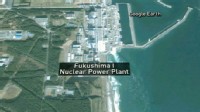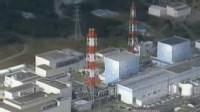New Leak Suspected at Fukushima Dai-ichi Nuclear Plant

In what may be yet another setback, the operator of Japan's crippled Fukushima Dai-ichi Nuclear Plant says radioactive water may now be leaking from a wastewater storage facility on site.
The Tokyo Electric Power Company, known as TEPCO, told reporters Thursday that nearly 60 tons of radioactive water may have spilled out, raising further concerns about the utility's ability to handle the worst nuclear crises since Chernobyl.
The latest leak was discovered amid efforts to transfer highly contaminated water from the number 2 and number 3 reactors to an improvised storage facility. TEPCO says the water level in the facility had dropped nearly two inches in just 20 hours, suggesting a leak.
The utility has been pumping massive amounts of water in an effort to cool three of Fukushima's reactors, a process TEPCO has said would be completed in three months. Large leaks have already been reported in reactors 1 and 2, and news of this latest leak is yet another setback in the effort to stabilize the reactors.
More than two months after a magnitude 9.0 earthquake and massive tsunami killed about 240,000 people and crippled Fukushima Dai-ichi, TEPCO is struggling to bring the plant under control. Earlier this week, the company said all 3 reactors had gone into a state of "meltdown" within 3 days of the magnitude 9.0 earthquake and the tsunami that followed, confirming what nuclear experts have suspected.
The melted fuel remains covered in water, and temperatures inside the containment vessel are below dangerous levels, officials said. But failure to disclose such information sooner, has outraged critics who say the utility and the Japanese government have responded too slowly.
At a press conference Thursday, Chief Cabinet Secretary Yukio Edano denied accusations of a "cover-up," but admitted the government needed to take seriously "the criticism that we haven't done enough to provide and circulate information."
Environmental group Greenpeace says the radioactive leaks are taking a toll on marine life. New data released by the group shows high levels of contamination in fish, shellfish, and seaweed samples taken 12 miles off the coast of the Fukushima plant.
Analysis by laboratories in France and Belgium found high levels of radioactive iodine and radioactive cesium in seafood, according to Greenpeace. Contamination levels were highest in seaweed samples, which contained radiation 50 times higher than official limits.
"Our data shows that significant amounts of contamination continue to spread over great distances from the Fukushima nuclear plant," said Greenpeace Radiation Expert Jan Van Putte. "Radioactive hazards are not decreasing through dilution or dispersion, but the radioactivity is instead accumulating in marine life."
The International Atomic Energy has launched its own investigation into the nuclear crises. A team of 20 IAEA experts arrived in Tokyo Monday on a fact-finding mission, where they plan to visit the Fukushima plant.






No comments:
Post a Comment